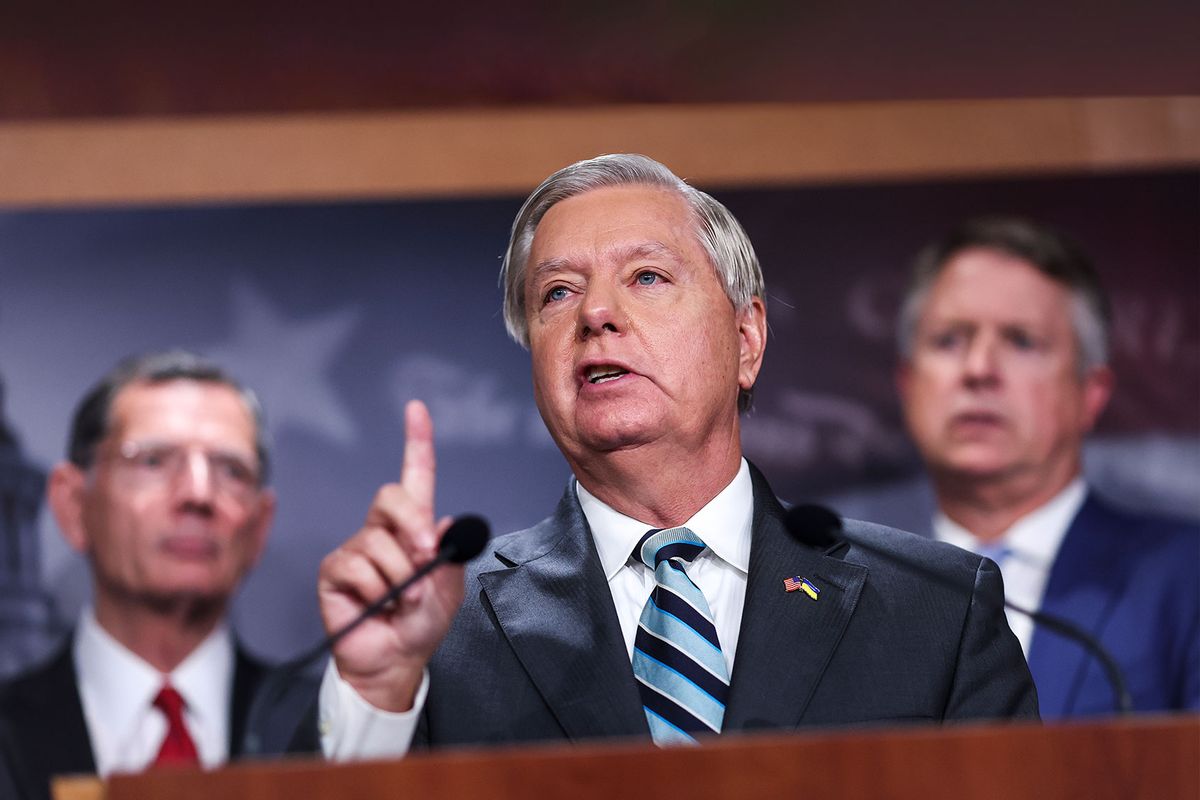Sen. Lindsey Graham faces his courthouse moment of truth.
On Aug. 15, Atlanta federal District Court judge Leigh Martin May ordered Graham to testify before the special Fulton County grand jury investigating then-President Donald Trump's Jan. 2, 2021, phone call to Georgia Secretary of State Brad Raffensperger.
In that call, Trump asked Raffensperger to "find 11,780 votes," which he asserted was one vote more than he needed to overturn Joe Biden's electoral victory in Georgia. Graham had himself made two phone calls to Raffensperger after the November 2020 election but before Trump's call. It's not hard to imagine what those calls were about.
Graham has three choices on how to proceed. Only one can redeem him as someone committed to the rule of law. That choice, by the way, would also be the safest way to avoid the kind of prosecutorial suspicion that could lead to Graham becoming a target of the Georgia investigation, as Rudy Giuliani became on Monday.
First, Graham could appeal, continuing his blanket resistance based on the almost certainly inapplicable "speech or debate" clause of the Constitution. That provision states that in all cases "except Treason, Felony and Breach of the Peace," senators and representatives "shall not be questioned" outside of Congress "for any Speech or Debate in either House." More in a moment on Judge May's reasons for rejecting its application here.
Second, Graham could appear before the grand jury and answer some of the prosecutor's questions, but continue to object on a question-by-question basis, asserting that the queries implicate his constitutional immunity, an avenue the Supreme Court has made quite narrow. He might try playing that card if continuing to hide the truth and remaining a Trump loyalist are his most important priorities.
Graham has three choices on how to proceed from here. Only one of those can redeem him as someone committed to the rule of law — and is the safest way to avoid potential prosecution.
Finally, he could comply with the court's order and testify, asserting his right not to incriminate himself if he needs to, but otherwise providing the information prosecutors seek. That option is the one any American genuinely committed to the rule of law would take. Fulton County District Attorney Fani Willis has good reasons to hear what Graham has to say.
Those reasons explain why Graham lost the first round in his battle to stay home and avoid a grand jury's questions: Willis is focused on the content of the two unrecorded phone calls Graham made in late 2020 to Raffensperger. She also wants to know whether Graham coordinated his calls with the Trump campaign or even with Trump himself.
Raffensperger and his deputy, Gabe Sterling, claim that Graham pressured them to assist Trump by tossing out ballots due to assertions about whether the voters' signatures matched those on file. Sterling and Raffensperger allege that Graham wanted Raffensperger to disqualify the entire vote in counties — such as Fulton, where roughly 525,000 votes were cast, more than 10% of the state's total — with high numbers of questioned signature matches.
Want a daily wrap-up of all the news and commentary Salon has to offer? Subscribe to our morning newsletter, Crash Course.
Graham denied any such intent. He told the media that he just wanted to improve the process going forward, with the upcoming Jan. 5, 2021, U.S. Senate runoffs in Georgia, ultimately won by two Democrats, Raphael Warnock and Jon Ossoff.
Graham's current claim that he was exploring possible future election legislation is undercut by the fact that, in his calls, he appears not to have mentioned any such potential legislation.
Thus, it is hardly surprising that Judge May rejected Graham's blanket reliance on the Constitution's "speech and debate" clause. One of us (Gerson) successfully represented the government in the D.C. federal court of appeals in Brewster v. United States, one of two Supreme Court cases on which Judge May relied. Brewster held that the clause "does not prohibit inquiry into activities that are casually or incidentally related to legislative affairs but not a part of the legislative process itself."
The question Judge May addressed was whether Graham was seeking to shield from scrutiny truly legislative activity or activity that was "political" or otherwise non-legislative in nature. As the Supreme Court has held, the Constitution does not shield such matters from a grand jury's inquiry.
For reasons that are apparent to laymen and lawyers alike, the Atlanta federal court rebuffed Graham's claim that his calls were entirely legislative information-gathering exercises. They instead involved a "Senator from South Carolina making personal phone calls to state-level election officials in Georgia concerning Georgia's election processes and the results of the state's 2020 election." The court wrote, "On its face, such conduct is not 'a manifestly legislative act.'"
Graham could now appear before the grand jury and object to whatever questions he claims intrude on his "speech and debate" clause immunity. While he could then return to federal court to litigate any dispute over his individual objections, the range of such objections would be limited, given that legitimate "legislative" matters obviously wouldn't include attempting to overturn state-based election results.
So the question for the gentleman from South Carolina at this juncture is whether he is to be seen as a full-throated MAGA-right ally, as a sophisticated politician employing the judicial process to try to protect Trump, or as someone who actually believes in the rule of law.
Read more
about the Georgia investigation



Shares